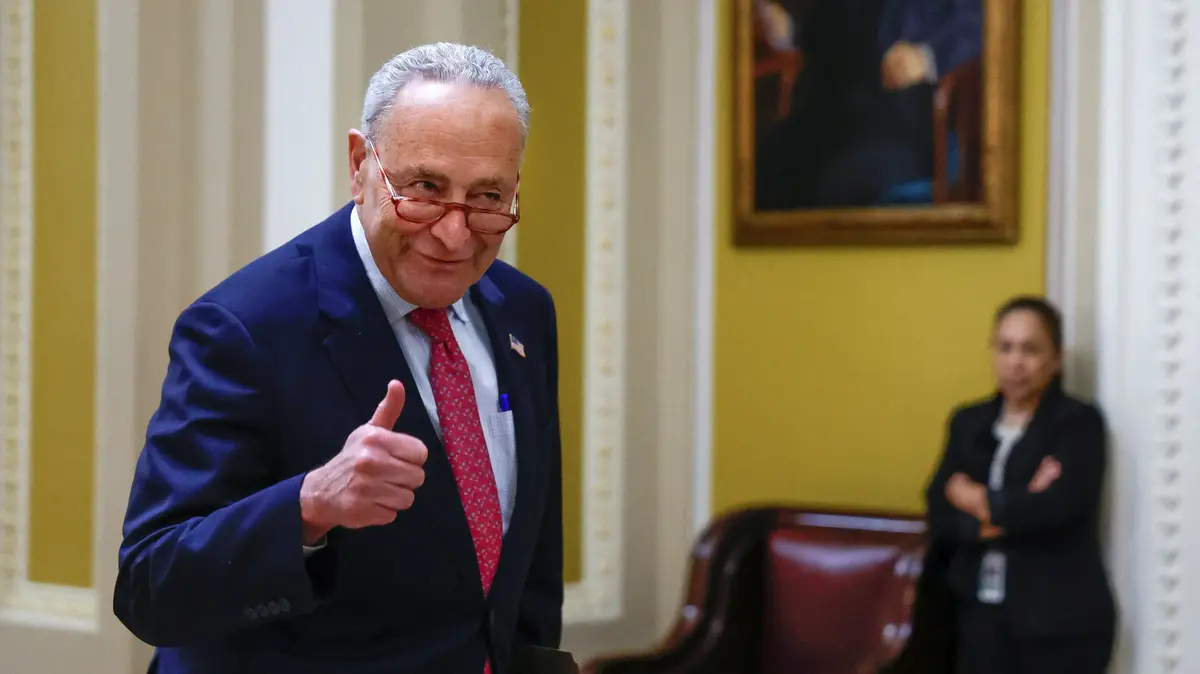Navigated the vote successfully. Senate Democratic leader Schumer, tonight (Photo: Reuters)
The U.S. Senate on Friday approved an agreement to raise the debt ceiling, days before the world's largest economy could go into default. A total of 63 senators from both parties voted in favor of the legislation, a day after it passed the Republican-controlled House. Now the agreement will reach President Joe Biden's desk, who will sign it, averting an economic catastrophe.
Monday was the date when the U.S. economy would default on its $31.4 trillion debt. Such a scenario had far-reaching implications for the United States in particular and the global economy in general, and in light of this, a compromise was reached between the Democrats and the Republicans. However, many in both parties were critical of the agreement, with 36 senators voting against it.
The legislation eventually passed with the support of 44 Democratic and 17 Republican senators, plus two independent senators — three more than the required majority. Democrats have a slim majority in the Senate, which has 11 lawmakers, including a tie-breaking vote from Vice President Kamala Harris. Among the four Democratic senators who voted against were Bernie Sanders, John Fetterman and Elizabeth Warren, who belong to the left wing of the party.
Several senators proposed <> amendments to the bill at the beginning of the debates, but all were quickly rejected, paving the way for a final vote. If any of the amendments passed, the new legislation would return to the House of Representatives, which was supposed to vote on it again, and little time would be left to ensure that the U.S. economy does not default.
"America can breathe a sigh of relief because this process will prevent us from defaulting," Democratic Majority Leader Chuck Schumer told Senate members.
The economic situation will have implications for his election chances. Biden returns to the White House tonight (Photo: Reuters)
A day before the Senate vote, the legislation passed the House by a large majority: 165 Democratic lawmakers joined 149 Republican lawmakers in approving the 99-page bill, which was carefully drafted by both sides.
Biden, whose economic situation will have a significant impact on his chances of re-election next November, thanked House Speaker Kevin McCarthy, a Republican, saying he negotiated in good faith. "Neither side got everything it wanted," the president said. "That's the responsibility of a government."
Republicans control the House by a narrow majority of 222 lawmakers to 213 Democrats, but McCarthy succeeded in passing the legislation with mainstream support from both parties. He described the package of bills as "the biggest cut and savings ever approved by Congress."
However, Eli Crane, a Republican from Arizona who promised to block the legislation, wrote: "More Democrats voted for the 'historic conservative victory' than Republicans. What a joke."
The legislation, which suspends the debt ceiling until January 2025, is expected to save $2011.<> trillion over the next decade, according to calculations by the Congressional Budget Bureau. The last time the United States came close to exceeding its debt ceiling was in <>, when S&P downgraded its rating, a decision that still stands today.
- news
- World News
- America
Tags
- United States
- Joe Biden

